Readings Newsletter
Become a Readings Member to make your shopping experience even easier.
Sign in or sign up for free!
You’re not far away from qualifying for FREE standard shipping within Australia
You’ve qualified for FREE standard shipping within Australia
The cart is loading…






Religion, History, and Politics in Nigeria is concerned with the problematic nature of religion and politics in Nigerian history. The book provides a lively and straightforward treatment of the relationship among religion, politics, and history in Nigeria, and how it affects public life today. By adopting various cultural, historical, political, and sociological perspectives, the text’s contributors provide an excellent introduction to the volatile mix of religion and politics in Nigerian history, as well as a range of strategic choices open to religious adherents. The complexity of the relationship among religion, history, and politics is organized around four themes: indigenous values and the influence of Islam and Christianity, colonialism and religious transformation, the religious landscape of the post-colonial period, and the rise of evangelism and fundamentalism. The volume provides an insightful guide to contemporary history, contemporary religion, and contemporary politics, enabling the reader to reach informed and balanced judgments about the role in religion in Nigerian history and politics. This opens the door for serious examination and debate, and will be excellent for use by the general reader and in political science, history, and religion courses.
$9.00 standard shipping within Australia
FREE standard shipping within Australia for orders over $100.00
Express & International shipping calculated at checkout
Stock availability can be subject to change without notice. We recommend calling the shop or contacting our online team to check availability of low stock items. Please see our Shopping Online page for more details.
Religion, History, and Politics in Nigeria is concerned with the problematic nature of religion and politics in Nigerian history. The book provides a lively and straightforward treatment of the relationship among religion, politics, and history in Nigeria, and how it affects public life today. By adopting various cultural, historical, political, and sociological perspectives, the text’s contributors provide an excellent introduction to the volatile mix of religion and politics in Nigerian history, as well as a range of strategic choices open to religious adherents. The complexity of the relationship among religion, history, and politics is organized around four themes: indigenous values and the influence of Islam and Christianity, colonialism and religious transformation, the religious landscape of the post-colonial period, and the rise of evangelism and fundamentalism. The volume provides an insightful guide to contemporary history, contemporary religion, and contemporary politics, enabling the reader to reach informed and balanced judgments about the role in religion in Nigerian history and politics. This opens the door for serious examination and debate, and will be excellent for use by the general reader and in political science, history, and religion courses.